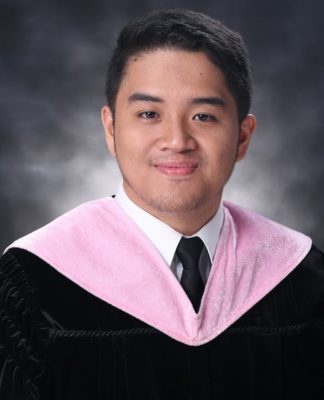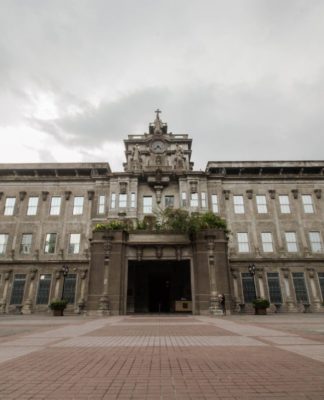LIKE the rest of the world, the Pontifical and Catholic University of the Philippines was both shocked and saddened with the sudden abdication of Pope Benedict XVI.
But the University of Santo Tomas expressed profound gratitude to the 85-year-old Vicar of Christ, known as a “teaching pope” and a staunch defender of the Church’s timeless truths amid a tide of secularism and moral relativism sweeping much of the western world.
“We are saddened and surprised but we are also grateful for the service he has rendered to the Church. We wish him well and we should also pray for the cardinals tasked to elect a new pope,” UST Rector Fr. Herminio Dagohoy, O.P. told the Varsitarian.
The Supreme Pontiff announced on Feb. 11 that he would renounce the Throne of Peter at 8 p.m., Roman time, on Feb. 28, ending close to eight years of a papacy that sought to renew the Christian message.
“After having repeatedly examined my conscience before God, I have come to the certainty that my strengths, due to an advanced age, are no longer suited to an adequate exercise of the Petrine ministry,” said Pope Benedict XVI in a message before a consistory.
The gathering of cardinals was supposed to confirm the canonization of three new saints, but Benedict surprised his closest collaborators by announcing what had not been done in more than seven centuries—the voluntary abdication of a pope. The last pontiff to do so was Celestine V, who quit in 1294 after reigning for only five months.
UST Central Seminary Rector Fr. Quirico Pedregosa, Jr., O.P. said the news “came as a surprise” considering the Pope had no known serious health problems.
Vatican officials have clarified that the Pope was not suffering from any disease, and that Benedict decided to renounce the papacy simply because of old age. There was also no “outside pressure,” said Vatican spokesman Fr. Federico Lombardi.
“In order to govern the bark of Saint Peter and proclaim the Gospel, both strength of mind and body are necessary, strength which in the last few month, has deteriorated in me to the extent that I have had to recognize my incapacity to adequately fulfill the ministry entrusted to me,” the Pope said.
Pedregosa said the people should respect the Pope’s decision, noting it was product of careful examination of his own capabilities.
“He is a person who thinks and prays a lot. He recognized that he does not have the strength adequate to lead the Church so we have to respect his decision as an expression of his own integrity,” Pedregosa added.
The former head of the Dominican Province of the Philippines also said the Catholic community has to be thankful for what the Pope had done for eight years of service to the Church.
“The initial impact would be sadness of losing such a good pope. He has been a good pastor, a good shepherd and a good teacher. We thought we would enjoy a little more of that kind of leadership,” he said.
Pope Benedict said he would spend the rest of his life “dedicated to prayer.”
Lombardi said Benedict won’t influence the conclave of cardinals that will choose the next Bishop of Rome.
“Dear Brothers, I thank you most sincerely for all the love and work with which you have supported me in my ministry and I ask pardon for all my defects,” the Pope said in Latin, the official language of the Church.
New evangelization
Benedict will leave behind his ambitious project to “re-propose” the Christian faith to the secular West under a “new evangelization.” He is leaving the papacy as the Catholic Church celebrates the “Year of Faith,” which aims to reintroduce Christian precepts using modern means.
The former Joseph Cardinal Ratzinger was elected the 264th successor of St. Peter on April 19, 2005, succeeding Pope John Paul II. His reign was not the “caretaker papacy” expected after the nearly three-decade pontificate of the well-loved and media-savvy John Paul II.
Benedict wrote three best-selling books reintroducing Christ to ordinary Christians as a response to reconstructions by liberal exegetes who sought the “historical Jesus” by stripping away his divinity.
The former prefect of the Congregation for the Doctrine of the Faith carried out his own vision of liturgical reform, not by constant adaptation but by emphasizing a dignified celebration of the sacrifice of the Mass. Benedict liberalized the traditional Latin Mass through the motu proprio Summorum Pontificum and set an example to fellow ministers of the Eucharist through his use of traditional vestments and gestures such as administering Holy Communion on the tongue to kneeling communicants.
Benedict also approved the corrected English translation of the Roman Missal to adhere to the original Latin.
He made landmark visits to Britain, Spain, Cuba, Turkey, and Africa, and opened full diplomatic relations with Russia.
He created “ordinariates” for disaffected Anglicans who wanted to return to Catholicism in a new approach to ecumenism, although a bid to take back members of the schismatic Society of St. Pius X failed due to differences over how to interpret Vatican II.
Pope Benedict is a proponent of the “hermeneutic of continuity,” which views Vatican II as continuation of the life of the Church, rejecting the “hermeneutic of rupture” which holds that Vatican II ushered in a modern Church in a complete break from the past.
A humble, good pope
Pedregosa, who had served in Rome as assistant to the Dominican master general for Asia-Pacific, described Benedict as a “humble pope, who has sought to dialogue with people in the light of faith.”
Despite scandals such as his butler’s leaking of his personal letters and attempts to hold him responsible for covering up child sex abuse cases, the pope remained firm in upholding Catholic doctrines.
“He tried to confront issues head-on because he engages people even in the level of reason. He was not afraid to speak to the world and to confront issues and that is a Catholic heritage, the dynamic relationship of faith and reason,” said Fr. Filemon de la Cruz, O.P., vice rector for religious affairs.
Pedregosa recalled that the University had invited the Pope to the Quadricentennial festivities. The invitation was declined due to the toll a long trip would take on the pontiff’s health.
New beginning for the Catholic Church
It was the common sentiment among priests that Pope Benedict XVI is a pope Catholics can be proud of, being an intellectual person in touch with reality, according to De la Cruz.
Benedict released three encyclicals—Deus caritas est, Spe salvi and Caritas in veritate—emphasizing the love of God for humanity.
Pedregosa said one of the greatest contributions of the Pope would be his teaching about God’s love, as discussed in his first encyclical Caritas in veritate or Charity in truth.
“Our dignity and identity is to become like God who is love and that has been revealed to us in the person of Jesus Christ,” he said.
Although this is not new, the Pope’s emphasis “on the centrality of the love of God revealed in Jesus Christ” is what made his teachings significant.
Pedregosa said the sudden change opens the Church to a new beginning.
“It opens for us a new chapter in the life of the Church. It brings about another possibility to have a new kind of pope because every pope brings something new to the life of the Church,” Pedregosa said.
De la Cruz said the Church’s leader will not necessarily be the best or the most popular, but one who responds to the call of the times.
“We pray that who will be elected will be the right person to lead us in these complex times,” he added.
A new pope is expected to be elected before the Church enters Holy Week. Pope Benedict is scheduled to bid farewell to the public during his last Wednesday general audience at St. Peter’s Square on Feb. 27.


















